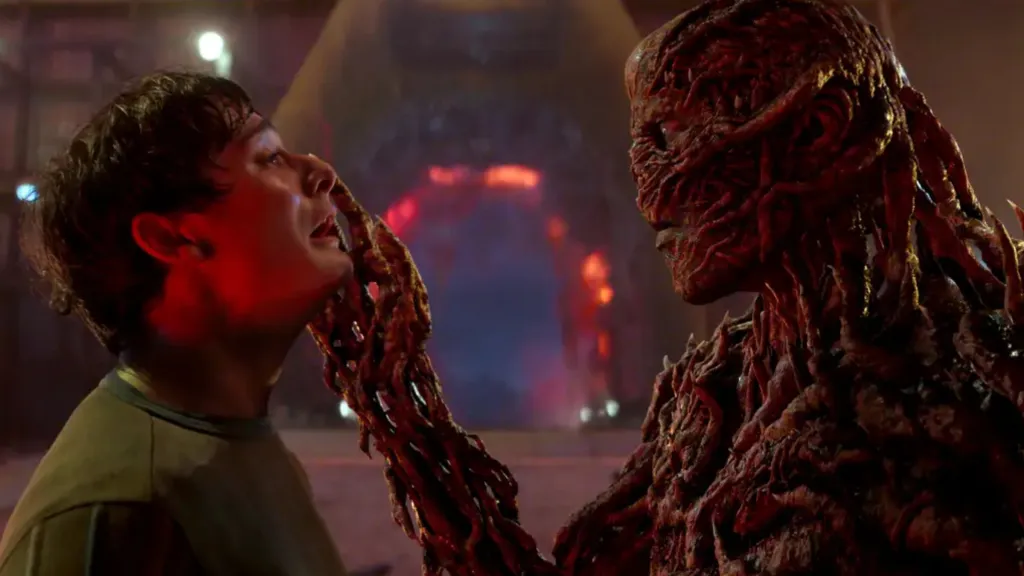Expectations for Stranger Things‘ final season have been high ever since the first official announcements last year. The cast and the Duffer Brothers gave countless interviews over the months, and many of them naturally included questions about what fans could expect from this long-awaited conclusion. Plenty of hints were dropped, and theories exploded online, but everything surrounding Will Byers (Noah Schnapp) was easily one of the most talked-about topics. After Season 3, most viewers started raising eyebrows about the character’s sexuality. Then, in Season 4, things became even clearer once Will’s arc opened up and his feelings for Mike (Finn Wolfhard) came into focus. And for a long time, many people assumed this detail would be treated as something separate from the narrative.
Videos by ComicBook.com
However, with the release of Volume 1 of the final season, fans were surprised to learn the real reason behind the decision to start developing Will’s sexuality way back then. Warning: Spoilers ahead for Season 5 of Stranger Things.
Stranger Things Fixed Part of Will’s Arc at the Perfect Moment

Will has been considered a key piece of Stranger Things‘ overall story for a long time now. In the first seasons, that wasn’t as obvious, and everything was still clouded by mystery. Over time, the show began dropping clues here and there so fans could start understanding that Eleven (Millie Bobby Brown) wasn’t the only one crucial to saving Hawkins from the Upside Down and Vecna (Jamie Campbell Bower). Suddenly, Will’s sexuality comes into play, with the show treating it like something to explore quietly in the background, implied through quick glances or small lines meant only for those already paying attention. And throughout Volume 1, that topic resurfaces when Will sees Robin (Maya Hawke) and Vickie (Amybeth McNulty) at the hospital, or in his smaller conversations with Robin.
Across the earlier seasons, the character grew around trauma, isolation, and the sense of always being out of place — a teenager whose adolescence never fully happened. But the show seemed afraid to name any of it, as if acknowledging his sexuality would somehow “break” the mystery surrounding him. Fans noticed this too, criticizing the vagueness and even accusing the show of queerbaiting. The result was a Will carrying massive feelings with no real space to express them, while every other character around him got to move forward. Was it frustrating to watch? Yes, but because no one knew what the Duffer Brothers intended, fans could only speculate. However, they don’t do anything by accident — and now fans really know it.
At the climax of Volume 1, in Episode 4, “Sorcerer,” a horde of Demogorgons attacks the Hawkins military base. By the end, Vecna appears and speaks directly to Will, reminding him that he was his first victim and tool of revenge, basically calling him vulnerable, weak, and broken. It’s the kind of moment where it seems like everything is lost, especially when one of the creatures is seconds away from attacking Mike. But when Will sees it happening, something in him shifts. In an emotional turning point, he holds onto positive memories like friendship, childhood and family, and that keeps him from collapsing under the terror and guilt. And that’s when something supernatural happens: Will manifests his psychic powers for the first time. Because of his connection to Vecna (and the Hive Mind), he channels the villain’s own abilities and destroys all the Demogorgons threatening his friends.
It’s interesting to see that the payoff doesn’t come as some overly dramatic twist (even if it’s impactful, it doesn’t feel random). Instead, it’s a natural progression of who Will has become after years of having a stalled, mysterious, and painful arc. It’s like the show finally stops treating him as a symbol and starts treating him as a person — and that alone explains why Stranger Things became a phenomenon. The show delivers what it promises, and it does it with emotional weight: Will accepts who he is and refuses to let his trauma or what was always framed as his weakness win, turning all of it into his defining moment of strength.
How Will’s Sexuality Shapes the Narrative of Stranger Things

After four seasons and years of waiting, Will’s character arc finally reaches its peak, revealing that what held him back all this time was pure fear of being who he truly is. And instead of making his sexuality a melodramatic turning point, the season places it at the center of his self-discovery, tying his internal monsters directly to the external ones. It gives his arc a human tension that’s been missing for a long time.
Besides, a big win is how the evolution fits inside the supernatural threat. Will has always been the character most connected to the Upside Down, and Season 5 finally uses that connection to explore who he really is. It’s not only about who he loves; it’s about everything he feels he has to hide to survive, whether in his hometown or in the terrifying places the narrative constantly drags him into. It’s a simple but effective parallel: the boy who spent years being “pulled” by forces he never chose is now, for the first time, deciding his own emotional boundaries. This metaphor works because it’s not forced — it’s built into his core.
And the shift doesn’t affect only Will’s personal arc, because it changes how the entire group relates to him. One of the most common complaints was the feeling that his friends were always a bit distant, almost excluding him. This season is actively trying to fix that. Does it place Mike at the center of this change? Yes, but not as another source of tension, rather as someone who finally needs to see his friend for who he is now, not who he used to be. It adjusts the dynamic in a more transparent and mature way without turning every conversation into a heavy emotional outburst.

Plus, the season also avoids turning Will into some kind of martyr. He spent years being defined by trauma, and that restricted the character. This time, the show is finally letting him react, desire, and feel like an active part of the narrative. For the first time in a long time, you can actually see a future for him instead of just a past everyone tiptoes around. Even the smaller scenes in the past where he was crying, uncomfortable, awkward, or more withdrawn work better now because they feel more grounded and meaningful. And maybe the most interesting thing (in the power-gain scene) is the built-in sense of delay, as if Will himself realizes he’s “saying things” that should have been said years ago.
And Stranger Things doesn’t try to pretend this development was always the plan — the show acknowledges it took too long and builds from there (the Duffer Brothers even said recently that this wasn’t improvisation). It’s a simple but sharp correction: when you let a character actually exist, the narrative breathes, meaning the story gets stronger because he finally starts driving the plot instead of being dragged by it. And that shift naturally makes the experience more engaging for viewers (it’s no coincidence this became the cliffhanger for Volume 2).
It’s incredibly satisfying to see Stranger Things finally do something concrete with Will’s sexuality, not as drama, but as part of his evolution and as fuel for the story as a whole. Season 5 already started with a more mature tone, but this specific choice pushed it even further. It’s a change that arrived at the perfect time and proves that, beyond being great at building characters, the Duffer Brothers have made these almost ten years of storytelling already genuinely worth it.
What do you think? Leave a comment below and join the conversation now in the ComicBook Forum!









